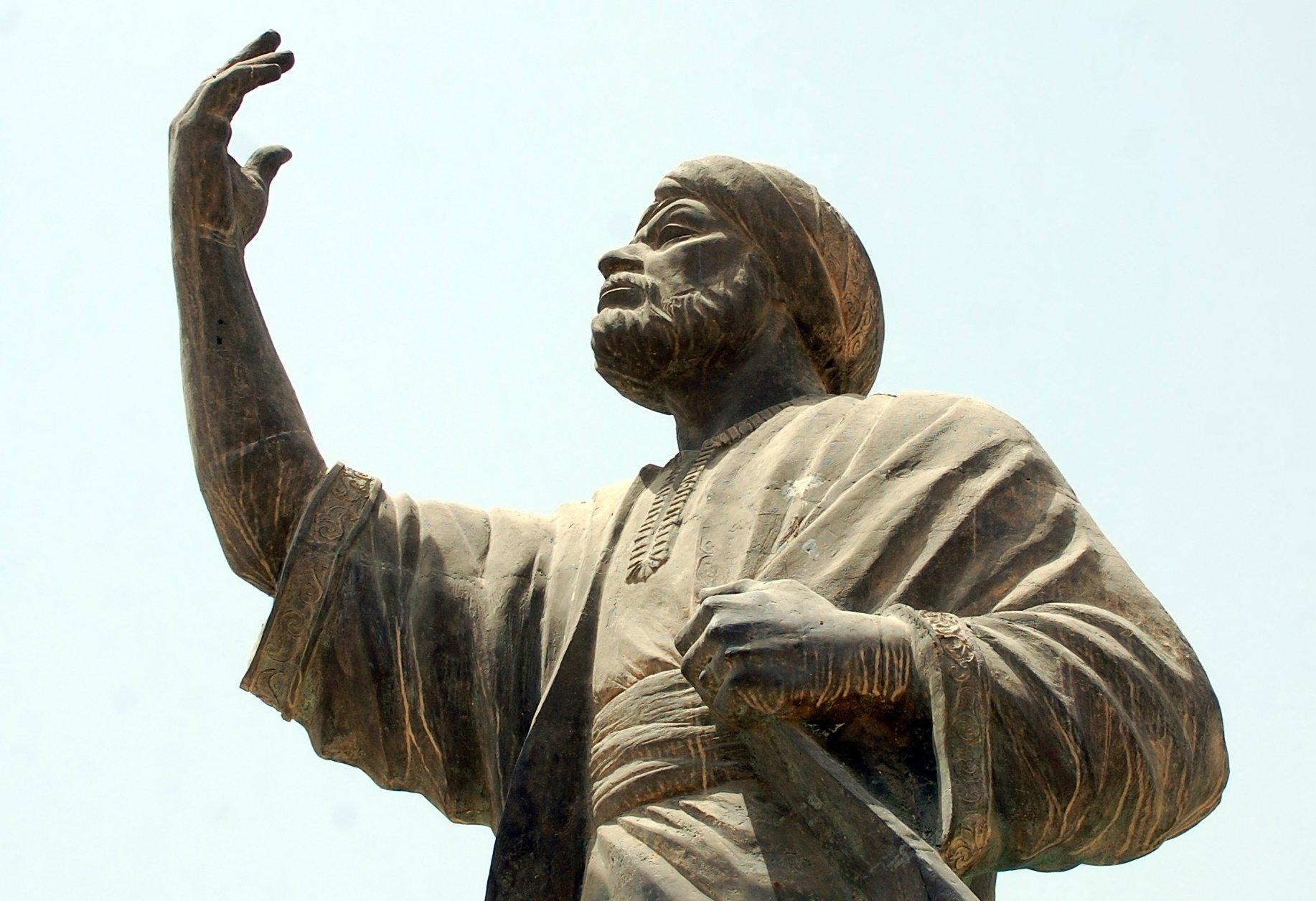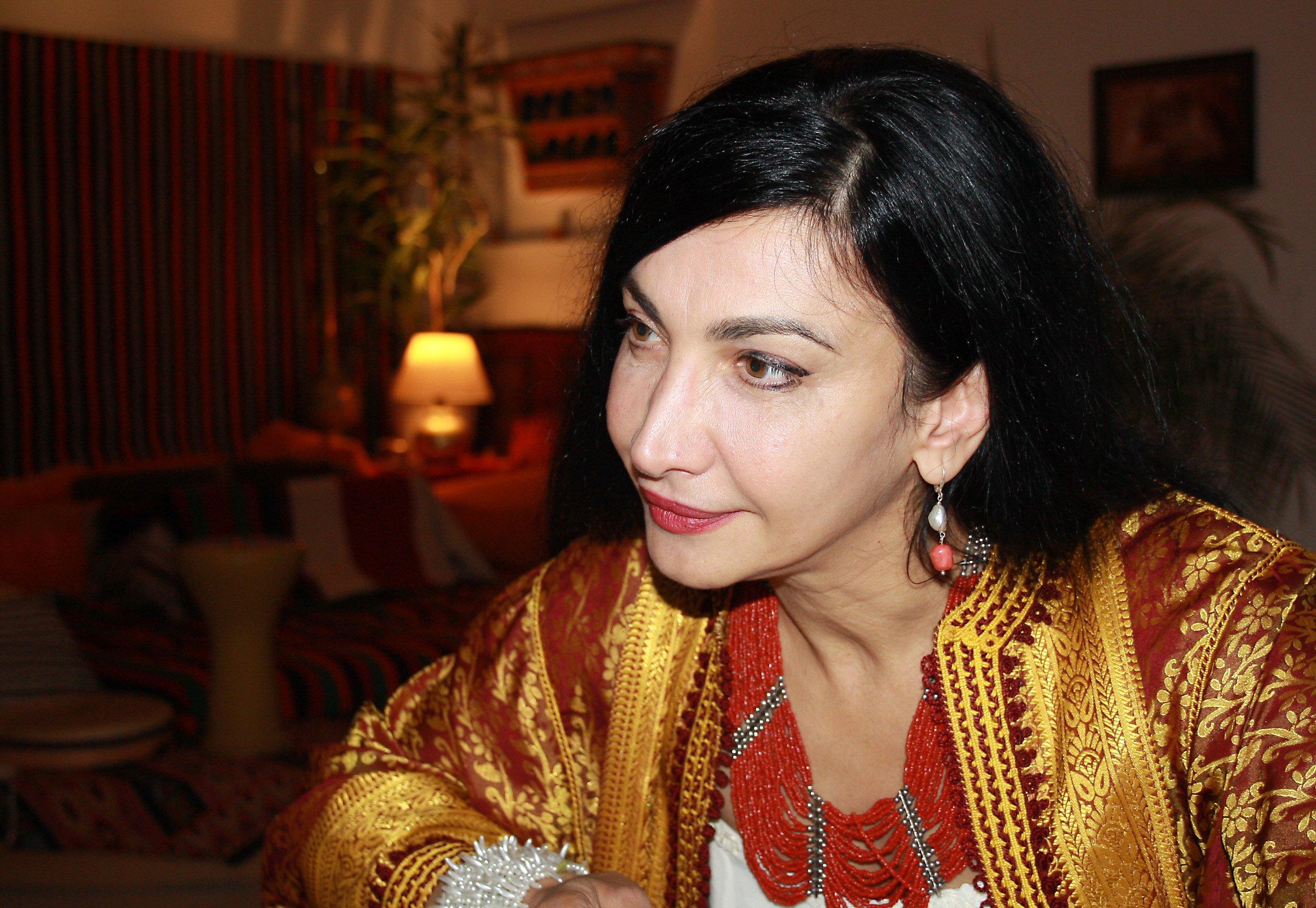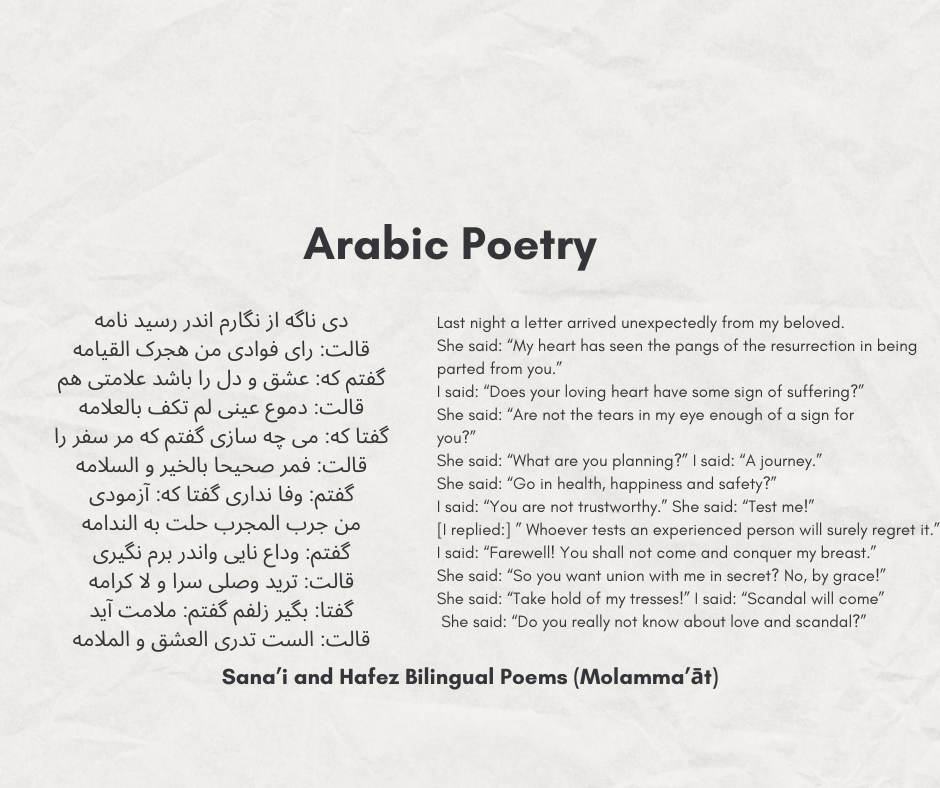Arabic culture has always been centered on poetry, not least because it was the first form of expression used by the language's first speakers to preserve their ideas, knowledge, and philosophical teachings. It was developed in the Arabian Peninsula more than 1,500 years ago, before Islam, and has since spread around the world.
Its scope has historically depended on the number of Arab governments and the influence of Islam. For instance, Andalusian poetry disappeared from the Iberian peninsula after Granada fell in 1492, yet 500 years later, its form and style continue to influence poets in Morocco.
Arabic poetry is most widely read in public settings, such as cafes, festivals, weddings, and funerals. The ode, poetry specifically about someone or something, has dominated the traditional Arabic poem for ages. Then, in the 1940s, modern approaches to poetry were adopted by Iraqi poets like the avant-garde Nazik al-Malaika, who combined classical form with Western inspirations like TS Eliot.

10 Arabic Poets of Repute
Composing poetry is an act of exploration and wonder driven by intuition and a love of words, much like reading and learning about them. That is a journey of the heart. Arabic poetry, metaphors, and pictures, together with surprises and astonishment, are used by contemporary Arab poets to attract readers and listeners even though they write in a wider range of genres and styles than ever before.
Many modern writers in the Arab world began their literary careers by practicing poetry, including Iman Mersal, Nouri al-Jarrah, and Maram al-Masri. They developed an understanding of Arabic's rhythm and accuracy as a result, being careful with their words, viewing everything differently, and searching for the transcendental beyond the ordinary. It is difficult to summarize the geography and history of Arabic poetry. The poets below are provided solely as a starting point for a larger world and are not arranged in any particular sequence.
Classical Arabic Poets
Imru' al-Qais 1. (501-565)
Al-Qais, who was the Kindah tribe's heir apparent and resided in the Arabian Peninsula, decided to lead a life of wandering, drinking, combat, and poetry. His Mu'allaqa, an ode that is so revered that it is written in gold on paper and then posted on the walls of the Kaabah in Mecca, the most important shrine in Islam, is considered to be his greatest work (its name translates as "hung ode").
According to legend, he once fell in love with a princess named Hind bint Utbah and eloped with her, only to be later captured and executed by her father.
Al-Qais is regarded by many as being superior to other poets even though other poets may have their well-known works because of his astounding metaphors and exquisite verses, which reflect his desire to be a deserving lover, wise man, warrior, and master. The literature of many who came after him has been greatly influenced by the work he perfected in this area.
One of his classics:
May You Be Happy This Morning, Worn Traces!
How many a day, and night I'd spend
with a woman, stark as a statue outlined,
her face aglow as she turns to her mate
like softly radiant candlelight;
her breast like the flare of a generous fire
by chilled men lit in the desert at night
in the wind come roving across the hills,
north, south, at the caravan staging posts.
Clear-cheeked, in her teens, so playful yet
that she makes me forget my clothes when I leave;
with rounds like the dunes that as children we loved
to tread for their smooth and velvety touch.
When her lover strips her, wanting all,
she leans to him lightly, holding back;
slim at the waist and firm as she twists
with quickening breath from intoxicant lips.
Al-Khansa (575-645)
One of the most well-known female poets in the Arab world is Tamadir bint Amr, also known as al-Khansa, who converted to Islam during the reign of the Prophet Mohammed. Her eulogies to her brother Sakhr, a tribal chief who was fatally wounded after a raid against the rival Bani Assad tribe, are her masterwork.
She uses beautiful analogies about death, life, love, and leaving in her lyrics. Al-Khansa claimed that Islam had taught her not to weep for the dead, despite the fact that four of her children died during Muslim fights with the Romans and Persians.
In addition to her poetry, Al-Khansa was also known for her eloquence and wit. She was highly respected in Arab society for her intelligence and knowledge and was often consulted on matters of importance.
After the conversion of her tribe to Islam, Al-Khansa continued to write poetry, but her style and subject matter changed. She wrote about Islamic themes, such as the Day of Judgment and the importance of piety.
Abu Nuwas (756-814)
Abu Nuwas's fame in the Arab world is based on his love of wine and his status as a homosexual love poet. He was raised in Iraq, the capital of the then-powerful Abbasid Caliphate, after leaving his birthplace of Ahvaz in modern-day Iran at an early age.
Over 1,500 of his rhymes still exist, including a number of masterpieces that capture his impression of Baghdad's multicultural culture, where people from all over the world congregated in bars, bookstores, bazaars, mosques, and bathhouses.

Since he loudly praised pleasure, male lovers, wine, music, and good company while vocally detesting war and the clash of swords, his art is snappy, impulsive, and full of sharp turns. Being near the Caliph Al-entourage, Ma'mun allowed Abu Nuwas to amuse him and his followers with stories, jokes, and lusty poems. He atoned for his sins on his deathbed and passed away a Muslim.
Al-Mutanabbi (915-965)
Al-life Mutanabbi's can best be characterized as an epic quest for fame, fortune, and power. He mastered Arabic verse unlike anyone else via his nearly 300 poems, and he considered poetry as an art to be learned and taught. His works spoke of wisdom, pride, courage, resisting the Romans, and worshipping one's ego.
Many of his lines are still used today as proverbs to reflect on friendship, love, departure, war, and death experiences in life. His nickname, Ahmed bin al-Hussein al-Kindi, which means "one who would be a prophet," was given to him at birth in Kufa, Iraq.
He traveled to numerous cities, including Baghdad, Damascus, Tiberias, Antioch, Aleppo, and Cairo, gaining money from the emirs for his literary adoration of them. Al-Mutanabbi was assassinated by thieves while traveling from Ahvaz in contemporary Iran; at the time, he had such a powerful following that the news of his passing resounded like thunder throughout the Muslim world.
What are the similarities between Hindi and Arabic? You can read Arabic Shayari and find out how close is Arabic to Hindi.
أنا الذي نظر الأعمى إلى أدبي وأسمعت كلماتي من به صمما
I am the one whose poetry the blind can see, And whose words the deaf can hear.
Abu al-Alaa al-Maarri (973-1057)
Al-Maarri lost his sight at the age of four as a result of smallpox. He spent the majority of his life confined to his home because, unlike his hero al-Mutannabi, al-Maarri valued isolation over social interaction. He was known as the poet of philosophers and the philosopher of poets by many of his admirers, who came to his home. His poetry incorporates philosophy, reflection, and pessimism.
The Luzumiyat and the Resalat Al-Ghufran (The Epistle of Forgiveness), which was written by Al-Ma'arri more than 200 years before Dante's Divine Comedy, concentrate on the experiences of poets in hell and paradise.
Nonetheless, opponents branded al-Maarri a heretic for making fun of adherents of all religions. In February 2013, a thousand years after he was active, Syrian extremists decapitated a statue of the philosopher and poet in Maarrat al-Numan, Syria. These attacks didn't just happen during his lifetime; they also happened long after he passed away.
Modern Arabic Poets
Mahmoud Darwish (1941-2008)
He was born in the British-mandated Palestinian village of al-Birwa, but he escaped when the Israeli government took over and drove hundreds of Arabs out. He frequently combined contemporary poetry with Arabic rhythmical meters, writing on topics like the 1948 Catastrophe or Nakba and the Palestinian Revolution from 1965 until 1993. Darwish received numerous honors from around the world, including the Prince Claus Foundation in 2004.
One of his finest poems:
من "أنا من هناك" لمحمود درويش
أنا من هناك وعندي ذكريات ولدت كما يلد البشر، عندي أم وبيت بعديد من النوافذ عندي إخوة وأصدقاء وزنزانة سجن مع نافذة باردة.
"I Come From There" by Mahmoud Darwish
I come from there, and I have memories Born as mortals are, I have a mother And a house with many windows, I have brothers, friends, And a prison cell with a cold window.
Iman Mersal (1966 - present)
Now serving as an Arabic literature professor at the University of Alberta in Canada, Mersal is an Egyptian poet. In Mersal's poems, the mundane and personal are explored before metaphors about parenting, life, and travel emerge. She composes poems in the free language, which is not governed by the Arabic rhythm: A collection of her writings titled These Are Not Oranges, My Darling was released in 2008.

Nouri al-Jarrah (1956 - present)
Al-Jarrah, a Syrian native, is best renowned for his use of free writing and for assembling a chorus of voices that are influenced by mythology, folktales, and the protagonists of classical Greek theatre. He currently works as the editor of the cultural publication Al-Jadeed and divides his time between London and Abu Dhabi. A Boat to Lesbos and Other Poems is a recent English translation.
Mohammed Abdel Bari (1985 - present)
Abdel Bari, who was born in Sudan and raised in Saudi Arabia, is regarded as one of the most important figures in modern classical Arabic poetry. His writing combines Sufism, Arabic mythology, Quranic narratives, and Islamic philosophy. Although his work has not yet been translated into English, he has produced three books of poetry and received numerous international awards, including the Arab African Youth Award in 2016.
Maram al-Masri (1962 – present)
Maram al-Marsi, a Syrian poet, explores themes of love, exile, longing for her native country, and the Syrian war in her prose poems. She left her country of Latakia in 1982 and eventually made her home in Paris. She is one of the most well-known poets in the Arab world. A Red Cherry on a White-tiled Floor, one of her most well-known collections, was translated into English in 2003.
Inspiring Arabic Poems (With Translation)
"وأنتِ تعودين" (Wa Anta Ta'udayni) by Mahmoud Darwish
وأنتِ تعودين إلى البيت، لا تحني رأسك، واسقطي دموعكِ على خديكِ، أنتِ آهٍ ودمعٌ، لكنَّكِ تمشينَ كطيرٍ تسعى للسماء، كلَّما زادَ الظلامُ، كلَّما قرَّبَتْ النَّجومُ، فتقولينَ: لن يموتَ اليأسُ مادمتُ أحيا، والحلمُ هوَ البيتُ، والحياةُ هيَ الطريقُ.
And as you return home, Don't let yourself be bowed down, Don't close your eyes to the tears, You are a sigh and a tear, But you are also the bird that flies, Seeking the sky, The darker the night becomes, The closer the stars appear, And you say: Despair will never die while I live, And the dream is my home, And life is the road.
لو كانوا يعلمون
لو كانوا يعلمون أن الحرية تُخوِّفُهم لما طاروا الأسرابُ إلى الأرجاءِ البعيدةْ
لو كانوا يعلمون أن الزمان يمضي بهم وأن الحياةَ قصيرة وليل الأرض أطولُ مِنَ النهارِ
لو كانوا يعلمون أن الريحَ تُعَلِّمُهم الطيرانَ في الفضاءْ والحبَّ يصنع العجائبَ ويَهديهِمُ الأحلامَ لكانوا ربما أطلقوا سراحَ السجينْ وأسقطوا الأسوارَ من حولِ قلوبهمْ
If Only They Knew
If only they knew that freedom frightens them, they wouldn't have flocked to distant corners.
If only they knew that time passes them by and that life is short, and that the earth's night is longer than its day.
If only they knew that the wind teaches birds how to fly in the sky, and that love creates wonders and gives them dreams, then perhaps they would release the prisoner and tear down the walls around their hearts.
أنت وحدكم واجهتم الصحراء الفارغة أنت وحدكم زرعتم الصحراء الواقعة أنت وحدكم سقيتم الأرض اليابسة
You alone faced the empty desert, You alone sowed the barren land, You alone watered the dry earth.
از خون دل نوشتم نزدیک دوست نامه
انی رایت دهرا من هجرک القیامه
دارم من از فراقش در دیده صد علامت
لیست دموع عینی هذا لنا العلامه
هر چند کآزمودم از وی نبود سودم
من جرّب المجرّب حلّت به الندامه
پرسیدم از طبیبی احوال دوست گفتا
فی بعدها عذاب فی قربها السلامه
گفتم ملامت آید گر گرد دوست گردم
و الله ما راینا حبا بلا ملامه
حافظ چو طالب آمد جامی به جان شیرین
حتی یذوق منه کاسا من الکرامه
From my heart’s grief I wrote a letter to my beloved.
For an age, from your absence, I have witnessed the resurrection
I have a hundred signs of separation in my eye
Are not the tears of these eyes of mine for us a sign?
However much I tried, she did not help me
Whoever tries the experience will regret it
I asked a doctor about the state of my beloved. He said:
Suffering is in nearness to her, health is in distance from her.
I said: Will scandal come if I wander about your alley?
By God! We have never seen a love without scandal.
Hafiz has come like one seeking a cup even at the price of his sweet soul,
that he might taste from it, a goblet of grace.
Arabic poetry has been an inspiration to famous poets for generations, the depth of the words used in every poem is a reminder of the beauty of poetry in conveying our deepest feelings.
Do you convey your love in the form of poetry?
Summarise with AI:















